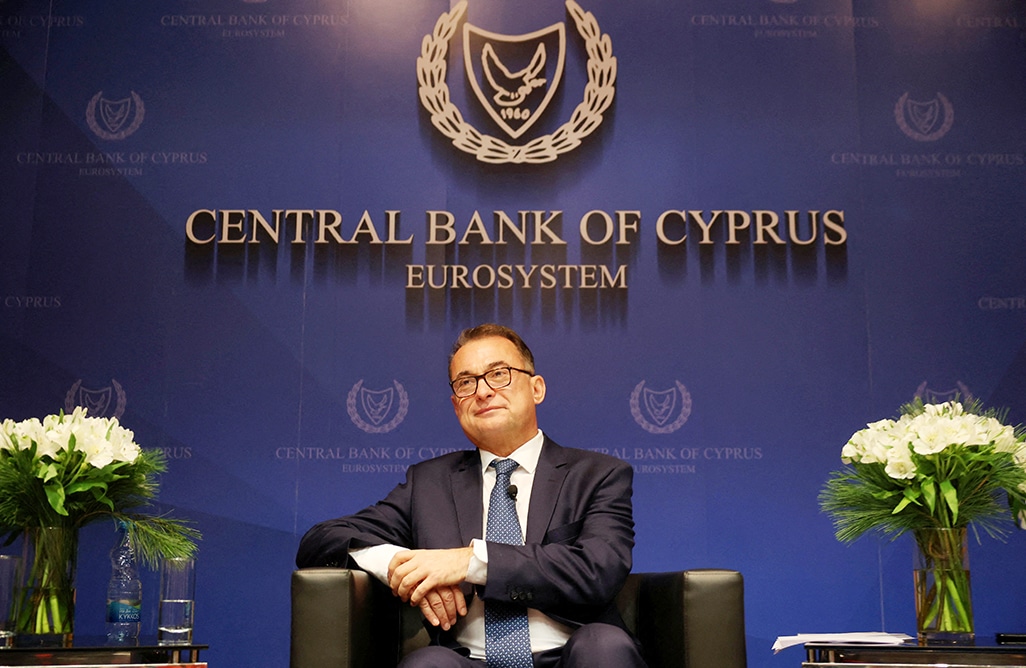CBC governor Constantinos Herodotou on Tuesday underscored the evolving European economy’s nuances and the impacts of prevailing monetary policies, during a conference hosted by the Central Bank of Cyprus during an official visit by Deutsche Bundesbank president Joachim Nagel.
On his part, the Bundesbank chief cautioned that while inflation has fallen, it is too soon to declare this issue to be over, stressing that the current monetary policy must remain in place for the time being.
Governor Herodotou opened the conference with an expression of appreciation for Nagel’s presence and esteemed insights, emphasising the notable economic shifts in the euro area post-pandemic.
He noted that the transition from goods to services in 2022 caused a deceleration in manufacturing, affecting the euro area’s GDP growth in 2023.
“The shift towards services was instrumental in bolstering the GDP growth,” stated Herodotou.
He highlighted a growth of 8.1 per cent in contact-intensive services in 2022 but observed a slowdown in these sectors starting in August 2023, as reflected in the Purchasing Managers’ Indices (PMIs).
Moreover, Herodotou correlated the resilient services sector with the robust labour market, attributing job retention schemes during the pandemic for preserving the economy’s productive capacity.
He explained that despite a significant GDP drop in 2020 due to lockdowns, employment fell only marginally by 1.4 per cent, reflecting the labour market’s strength.
However, concerns emerged about the recent trends where employment growth outpaced GDP growth, signalling potential productivity challenges.
“Labour-intensive services and labour hoarding by firms led to a productivity imbalance,” he said.
What is more, in 2023, signs of a labour market slowdown emerged, with softening employment expectations and moderate vacancy rates.
The slight increase in the euro area’s unemployment rate to 6.5 per cent in October 2023 hinted at changing economic dynamics, despite robust wage growth.
Regarding economic outlook, governor Herodotou expressed positivity, noting projections indicating moderated growth in the euro area without a hard landing.
Cyprus, expecting relatively higher economic growth rates, foresees a 2.4 per cent increase in 2023, rising further to 3.1 per cent in 2025.
Addressing inflation, he highlighted a substantial correction in the euro area’s inflation landscape, dropping to 2.9 per cent in October 2023 from the 2022 peak of 10.6 per cent.
The CBC governor reiterated the ECB’s commitment to maintaining well-anchored inflation expectations, crucial in averting price-wage spirals.
Moreover, the conference underscored the imperative to accelerate the green transition amidst the ongoing energy crisis.
“Policymakers must address challenges effectively,” Herodotou said, highlighting the shift in consumption patterns towards net-zero emissions, expecting changes in investment dynamics.
Concluding on the ECB’s monetary policy actions, Herodotou emphasised adaptability to meet economic shifts, ensuring price stability for a prosperous euro area.
“We aim to adjust our sails to reach our destination,” he affirmed, stressing the need for continual policy adaptation in a dynamic economic environment.
Nagel, who also met President Nikos Christodoulides, shared his insights on the euro area’s economic outlook and prevailing inflation dynamics, stressing the importance of maintaining price stability.
Nagel began by acknowledging Cyprus’ historical significance, emphasising its deep-rooted cultural heritage and its place at the heart of Europe.
He highlighted the importance of understanding common European heritage and its reflection in the euro currency, connecting it to the continent’s historical and cultural richness.
“Nicosia is the easternmost capital city in both the European Union and the euro area. As I learned during my flight, we are now more than two full degrees longitude east of the Great Pyramid of Giza,” Nagel said.
“Some people may think Cyprus is pretty much at the edge of Europe. I don’t think so. Cyprus is at the heart of Europe, and is home to some of Europe’s oldest and deepest roots,” he added.
Transitioning to modern economic challenges, Nagel delved into the current state of the euro area’s economy, citing a period of pronounced weakness characterised by a slight real GDP increase and dampened private consumption and external demand.
Projections suggested a moderate recovery in 2024, projecting real GDP expansion at 1 per cent in the next year and 1.5 per cent by 2025.
Discussing inflation, he noted a decrease in inflation rates over the next two years, albeit remaining at levels considered too high for too long.
Moreover, Nagel highlighted the swift surge in inflation throughout 2021 and the subsequent monetary policy responses to combat this.
The Deutsche Bundesbank president also emphasised the need to maintain current interest rate levels to support a return to target inflation and prevent expectations from losing their firm anchoring.
Regarding the ongoing monetary policy actions, Nagel detailed the measures taken, including the halting of asset purchases, interest rate hikes, and balance sheet reductions, emphasising the commitment to combating high inflation.
He cautioned against premature speculations about lowering interest rates, citing the importance of the future path of interest rates in shaping inflation expectations.
“Inflation rates are expected to decrease over the next two years. This is encouraging. Nevertheless, inflation has remained too high for too long. It is thus too early to declare victory over inflation. Monetary policy has to stay the course,” Nagel explained.
Addressing concerns about the tight monetary policy’s impact on economic growth, he expressed confidence in avoiding a “hard landing,” highlighting favourable conditions such as a tight labour market, low levels of corporate and household debt, and active investment.
Nagel stressed the need to avoid loosening policy too early to prevent a potential need for stronger tightening measures in the future, advocating for caution and ensuring a timely return to price stability.
Concluding his speech, Nagel underlined the importance of staying the course and not easing policy until a sustainable return to price stability is certain.







Click here to change your cookie preferences